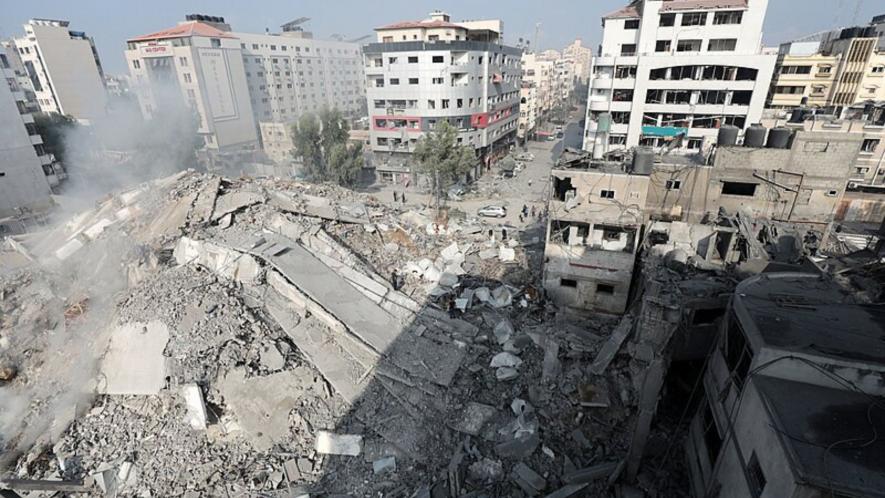No War is Just, Not Even ‘Just Wars’

Image Courtesy: Wikimedia Commons
The devastating cycle of wars and their aftermath breed skepticism, despite efforts to assert human rationality and inherent goodness. The inability of human reason to prevent violence and war is profoundly disturbing.
Philosopher Thomas Hobbes saw human nature as inherently selfish and violent, leading him to describe a stateless society as a life of “bellum omnium contra omnes” or “a war of all against all”. This justified a strong authoritarian state to maintain order. In contrast, philosopher John Locke had a more optimistic view, believing that a political state was necessary only to protect moral societies from rogue elements and to preserve peace.
A world without war would require widespread compassion, as envisioned in Rousseau’s state of nature, or a strong moral sense of justice. In today’s world, this would also mean empathetic international community and effective institutions.
Unfortunately, nations’ greed for military expansion and the lack of powerful international organisations to mediate conflicts between nations have made the world a dangerous place to live in. In this context, the concept of just-war gains significance. The question is: under what circumstances, if any, can waging war be morally justified?
The recent Iran-Israel conflict has led many theorists to echo war poet Charles Sorley’s sentiment that “there is no such thing as just war”. While war is considered an evil, some argue that certain causes can justify it, with moral justification depending on the compelling nature of the motive and the importance of the cause.
The ‘just war’ debate has its roots in ancient Greece and Rome and was later developed by the Church, shaped by Christian thinkers like St. Augustine and St. Thomas Aquinas. They sought to balance pacifism with the needs of governance, establishing guidelines for justifying war and its conduct.
The ‘just war’ theory revolves around two key principles: Jus ad bellum (Justification for waging war) and Jus in bello (Justice in conducting war). These principles are distinct, and fulfilling one doesn’t necessarily mean fulfilling the other, as a war can be just in its cause but fought unjustly, or vice versa.
The principles of ‘just war’ theory, especially jus ad bellum, have evolved over time. A general consensus has formed around six key conditions to justify war: just cause, right intention, proper authority, last resort, prospect of success, and proportionality. However, interpreting and applying these conditions can be contentious.
Historically, religious motivations were seen as a “just cause” for war, but modern views consider them ideological and less legitimate. Today, a just cause typically emphasises self-defence, protection of innocent lives and humanitarian intervention. These norms are widely regarded as more acceptable justifications for war.
Iran’s counter-offensive against Israel is an example of a just cause, as it was fought for self-defence against aggression and protecting sovereignty and territorial integrity. Intervening to help another country facing similar aggression, as in coalition forces liberating Kuwait in 1991, can be another example. However, Israel’s recent attack on Iran would be considered unjustified under this condition as pre-emptive strikes against potential threats are not considered to be a just cause.
A just cause isn’t enough; the intention behind military action must also be right. If ulterior motives, such as national interest or territorial gain, drive military action, it loses legitimacy. For instance, liberating Kuwait from Iraqi aggression is justified if done to restore sovereignty, but not if driven by oil interests. It can be seen that wars, like the US bombing in Iran, are driven not solely by ethical or geopolitical considerations, but also by economic interests and military-industrial complex, as economists Prabhat Patnaik and Richard Wolff recently pointed out.
The decision to wage war should be made by a proper authority, a sovereign power, authorised by a country’s Constitution. This ensures due process and legitimacy. However, the concept of proper authority can be complex, raising questions about the legitimacy of governments, decision-making, and the relation between leaders and citizens.
The resistance of people in war-waging countries, such as Israel or US, raise questions about the legitimacy of wars fought, relationship between states and citizens, and decision-making process on war.
Being the last resort is another condition for a ‘just war’. War should be the last resort, after exhausting all peaceful options like diplomacy and economic sanctions. Military action is only justified if conflicts can’t be resolved through alternative means. Israel’s attacks on Palestine and Iran seem to disregard this principle, prioritising force over diplomacy and rationality.
Military intervention requires a reasonable chance of success. But, defining “success” in war can be challenging. Also, while some argue that a weaker power shouldn’t resist a stronger aggressor if the odds are low, others believe that resisting aggression can be morally justified regardless of the likelihood of success, prioritising justice over prudence and avoidance of futile actions.
Proportionality, another condition, requires weighing the desired outcome against the potential consequences of military action. The benefits of righting a wrong must outweigh the anticipated harm, including casualties and suffering. However, measuring outcomes of a war can be difficult. Here, national security and international influence may take precedence over ethical considerations as well, as seen in cases like Russia’s actions in Ukraine or Israel’s attacks on Iran.
‘Justice in war’ (Jus in bello), the second principle of the just-war theory, focuses on two key considerations: proportionality and discrimination. While proportionality ensures matching military means to ends, avoiding excessive harm, discrimination distinguishes between combatants and non-combatants, protecting civilians. These principles minimise unnecessary suffering and ensure military actions are morally justifiable. Jus in bello aligns with international law, such as the Hague Rules and Geneva Conventions, violations of which can be considered war crimes.
Justice-in-war (Jus in bello) is crucial because even ‘just wars’ can be fought unjustly. For instance, targeting civilians or non-combatants, like Iran bombing a hospital in Israel, can render a ‘just war’ unjust. As wars unfold, the pursuit of victory can overshadow justice, leading to unjust actions and practices.
Wars often violate both principles of just-war theory, as in Israel’s wars on both Palestine and Iran. Using an unsubstantiated and unverified claim of potential nuclear threat by Iran as a reason for war, it failed the condition of a just cause. By attacking hospitals and continuously butchering starving children in Palestine, it failed a just conduct of war too.
A strong and effective international body is crucial for ensuring peaceful coexistence among sovereign nations. Many conflicts could be mitigated or avoided with more decisive international action. As political, ideological, or trade interests overshadow ethics in conflicts, it’s disheartening to see the international community and institutions, like the UN, failing to intervene effectively.
Though logically possible, in practice, one doesn’t find ‘just wars’ being conducted justly. Wars persist, causing destruction and suffering, and we haven’t devised enough mechanisms to avoid them. The ideal should be to avoid wars in the first place and to regulate them, when unavoidable. It would mean fairness should guide international relations, prioritising human-centric approaches over military action and ultimately finding alternative solutions to conflicts. It highlights the need for reform and more effective global governance.
Kumari Sunitha.V is Assistant Professor and Head, Department of Philosophy, Madras Christian College, Tambaram. Bins Sebastian is Assistant Professor, Department of Philosophy, Madras Christian College, Tambaram, Tamil Nadu. The views are personal.
Get the latest reports & analysis with people's perspective on Protests, movements & deep analytical videos, discussions of the current affairs in your Telegram app. Subscribe to NewsClick's Telegram channel & get Real-Time updates on stories, as they get published on our website.























